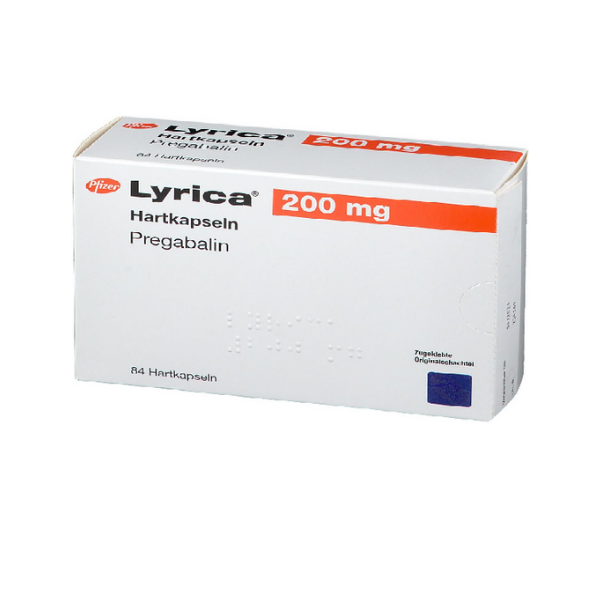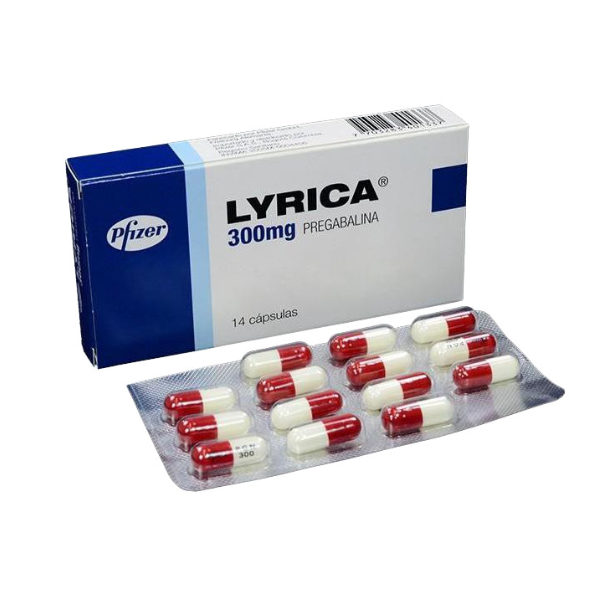Description
Introduction
Lyrica 200 mg is a widely recognized prescription medication designed to manage specific types of chronic pain, seizure disorders, and anxiety issues. As a hard capsule containing pregabalin as its active ingredient, Lyrica belongs to the class of anticonvulsants. Originally approved by the FDA in 2004, Lyrica has since become a trusted medication for patients dealing with neuropathic pain, epilepsy, and generalized anxiety disorder (GAD).
Mechanism of Action
Lyrica works by binding to voltage-gated calcium channels in the central nervous system, specifically targeting the alpha-2-delta subunit. This action reduces the release of various neurotransmitters, including glutamate, norepinephrine, and substance P. The reduction in these chemicals helps decrease pain perception, alleviate anxiety, and stabilize electrical activity in the brain, which is essential for preventing seizures.
- Pain Modulation: Pregabalin effectively reduces the excitability of nerve cells, which is crucial in managing neuropathic pain—a pain type that results from nerve damage and can cause persistent discomfort.
- Seizure Reduction: By lowering neurotransmitter release, Lyrica helps to stabilize nerve cell firing, reducing the likelihood of seizures and serving as a complementary therapy in epilepsy.
Uses of Lyrica 200 mg
- Neuropathic Pain: Lyrica is highly effective in managing neuropathic pain, such as that resulting from diabetic peripheral neuropathy (nerve damage due to high blood sugar levels in diabetics), postherpetic neuralgia (pain following shingles), and fibromyalgia (a chronic disorder that leads to widespread musculoskeletal pain). Its pain-relieving properties provide patients with relief from discomfort, allowing them to resume daily activities.
- Seizure Control: Lyrica is often prescribed as an adjunctive therapy for adults with partial-onset seizures. When combined with other anti-seizure medications, Lyrica can enhance seizure control, reducing the frequency of seizures.
- Fibromyalgia: In patients with fibromyalgia, Lyrica helps alleviate pain and tenderness, making it easier for patients to engage in physical activity and improve their overall quality of life.
- Generalized Anxiety Disorder (GAD): Lyrica’s effectiveness in GAD is due to its influence on neurotransmitter levels, helping to reduce symptoms of anxiety and enabling patients to feel more relaxed and in control of their mental health.
Dosage and Administration
- Standard Dosage Guidelines: The dosage of Lyrica 200 mg is usually tailored to the individual’s specific condition and overall response to treatment. Commonly, patients start with a low dose, gradually increasing to the therapeutic level. For many conditions, doses range between 150 mg and 600 mg per day, divided into two or three doses. The prescribing doctor determines the exact dose based on factors such as the patient’s weight, severity of symptoms, and potential side effects.
- Administration Instructions: Lyrica is taken orally, typically with or without food. It’s important to swallow the hard capsule whole with water without crushing, chewing, or opening it. Sticking to the same time each day for doses ensures a consistent level of the medication in the bloodstream, optimizing its effects.
- Missed Dose and Overdose: If a patient misses a dose, it should be taken as soon as remembered unless it’s close to the time for the next dose. Doubling up doses is discouraged, as it can increase the risk of adverse effects. In the event of an overdose, immediate medical help should be sought, as it may lead to serious symptoms, including confusion, extreme drowsiness, and breathing difficulties.
Benefits of Lyrica 200 mg
- Effective Pain Relief: Lyrica often provides relief within the first few days to a week of starting treatment. This fast onset is particularly beneficial for individuals experiencing debilitating pain, such as those with diabetic neuropathy or postherpetic neuralgia, who are looking for immediate and lasting relief.
- Seizure Control: As a supplemental treatment, Lyrica can help enhance seizure control for patients who may not achieve adequate relief with a single medication. This complementary role is significant in reducing the frequency of seizures and enhancing quality of life.
- Improved Quality of Life: By effectively reducing symptoms associated with nerve pain, seizures, and anxiety, Lyrica 200 mg enables patients to engage more fully in their daily activities. Patients report being able to return to work, resume social engagements, and feel more connected with family and friends.
Side Effects of Lyrica 200 mg
Like all medications, Lyrica has potential side effects, which vary from mild to severe. Understanding these side effects helps patients recognize what is expected and when to seek medical attention.
Common Side Effects:
- Dizziness and drowsiness are among the most common side effects and usually lessen as the body adjusts to the medication.
- Dry Mouth: Staying hydrated can help manage this.
- Blurred Vision: This effect is generally temporary but should be monitored.
- Weight Gain: Some patients experience increased appetite and weight gain.
Severe Side Effects:
- Allergic Reactions: Although rare, Lyrica can cause serious allergic reactions, including swelling of the face, mouth, or tongue and difficulty breathing. Immediate medical help is crucial if these symptoms appear.
- Mood Changes: Lyrica has been associated with an increased risk of suicidal thoughts or behavior. The FDA warns that patients, particularly those with a history of mental health issues, should be monitored for any sudden mood changes.
- Withdrawal Symptoms: Abruptly stopping Lyrica can lead to withdrawal symptoms like headaches, nausea, and sweating. Tapering off the medication under medical guidance minimizes these effects.
Substitutes
Precautions and Contraindications
- Medical Conditions: Patients with renal impairment (kidney issues) require a lower dosage due to Lyrica’s metabolism and excretion through the kidneys. Those with heart problems or a history of substance abuse should use Lyrica cautiously, as it has a small potential for dependency in some cases.
- Drug Interactions: Lyrica may interact with other medications, especially opioids, antihistamines, and anti-anxiety medications, increasing the risk of drowsiness and respiratory depression. It’s essential to discuss all medications, including over-the-counter drugs and supplements, with a healthcare provider.
- Pregnancy and Breastfeeding: Pregnant and breastfeeding women should avoid Lyrica, as studies suggest it can cross the placenta and be present in breast milk, potentially affecting the baby’s development.
- Alcohol and Lyrica: Combining alcohol with Lyrica can intensify side effects like dizziness and impaired motor function. Alcohol also increases the risk of liver strain and should generally be avoided.
Comparing Lyrica with Other Medications
- Lyrica vs. Gabapentin: Gabapentin, another medication used for neuropathic pain and seizures, has a similar mechanism of action but is less potent than Lyrica. Gabapentin may require higher doses to achieve the same effect as Lyrica, and some patients find Lyrica more effective, though it can be costlier.
- Lyrica vs. Other Pain Relievers: Unlike opioids, Lyrica is non-addictive for most patients and doesn’t have the same high-risk profile. While NSAIDs like ibuprofen are effective for general pain, they do not target nerve pain in the way that Lyrica does, making it a preferred option for neuropathic pain.
- Other Brands and Generic Versions: Generic pregabalin may offer a more affordable option with similar efficacy, though Lyrica remains one of the most trusted brand names for its established track record.
How to Use Lyrica Safely
- Following Dosage Instructions: Patients should strictly follow the prescribed dosage and never adjust the dose without consulting a doctor.
- Monitoring for Side Effects: Regular check-ups with the prescribing physician are advisable, especially when starting or adjusting the dose. Noticing and reporting side effects early can help prevent complications.
- Gradual Discontinuation: Discontinuing Lyrica should always be done gradually to avoid withdrawal symptoms, which include anxiety, sleep disturbances, nausea, and increased pain.
Patient Experience and Testimonials
Many patients have found relief through Lyrica for otherwise unmanageable pain and discomfort. For instance, patients with diabetic neuropathy often report that Lyrica alleviates their burning, tingling, or shooting pain, allowing them to sleep better and function during the day. Similarly, fibromyalgia patients find Lyrica helpful in reducing the intensity of widespread pain and muscle stiffness. Although some side effects, like dizziness or mild weight gain, may occur, these are typically manageable and often fade as the body adapts.










Reviews
There are no reviews yet.